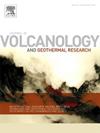那不勒斯火山区坎皮弗列格雷火山口(>40 ka)前的爆炸性火山记录:意大利南部那不勒斯以北科学钻探的新发现
IF 2.4
3区 地球科学
Q2 GEOSCIENCES, MULTIDISCIPLINARY
Journal of Volcanology and Geothermal Research
Pub Date : 2024-10-18
DOI:10.1016/j.jvolgeores.2024.108209
引用次数: 0
摘要
坎皮弗莱格雷(Campi Flegrei,意大利南部)火山口周围近喷口地段记录的最古老火山活动不超过 ∼78 ka,尽管中远距离和超远距离的表层地层记录表明,该地区的火山活动在此之前就已经开始了。由于交通不便,且记录较早年代地层区间的剖面较少,因此通过对邻近地区的地表地质调查来重建形成大型火山口的坎帕尼亚岩(CI)爆发(40 ka∼)之前的活动具有挑战性。为了填补对 CI 火山喷发前活动的认识空白,我们在那不勒斯市北部的 Ponti Rossi 地区钻了一个 113.2 米深的科学钻孔。之所以选择 Ponti Rossi 地区作为 CF 破火山口形成前地层环境的代表,是因为该地区距离任何拟议的破火山口边缘或下倾区域都很近,尽管是在外部。岩芯演替由被古沉积物、再加工腐殖化沉积物或亚海蚀表面分隔的火成碎屑岩沉积物组成,已对其进行了测井和取样,以进行沉积学、矿物学和地质年代分析。确定了 31 个火成岩单元(PU)。根据回收沉积物的结构/纹理特征,第一个相关结果是可能不存在 CI,而 15 ka ∼ 15 ka 那不勒斯黄凝灰岩喷发的沉积物(CF 的第二大火山口形成事件)代表了最浅的沉积物。从深度为 45.8-45.9 米(PU-29)和 99.5-99.6 米(PU-1)的幼年碎片中提取的碱性长石的 40Ar/39Ar 年龄测定结果分别为 59.03±0.50 ka 和 110.00±0.35 ka。最深取芯单元的年龄具有与近沉积相一致的沉积学特征,是 CF 破火山口边界附近序列中获得的最古老的火成碎屑沉积年龄,并将这一地区的爆炸历史延长了 30 千年。此外,根据 40Ar/39Ar 年龄限制,那不勒斯火山区的火山历史至少增加了 29 次喷发,时间跨度为 ∼59-110 ka。这些喷发主要发生在CI火山口形成之前的CF地区,并证明了迄今未知的强烈爆炸活动。本文章由计算机程序翻译,如有差异,请以英文原文为准。
The pre-Campi Flegrei caldera (>40 ka) explosive volcanic record in the Neapolitan Volcanic Area: New insights from a scientific drilling north of Naples, southern Italy
The oldest volcanism documented in near-vent sections around the Campi Flegrei (CF, southern Italy) caldera does not exceed ∼78 ka, even though the mid- to ultra-distal tephrostratigraphic record would suggest that activity in this area started well before that. Reconstructing the activity preceding the large caldera-forming Campanian Ignimbrite (CI) eruption of ∼40 ka, via surface geological surveys in proximal areas, is challenging because of the poor accessibility and paucity of sections recording the older chronostratigraphic interval. In order to fill the gap in knowledge of the activity preceding the CI eruption, a 113.2 m deep scientific drillhole was emplaced in the Ponti Rossi area, in the northern part of the city of Naples. The Ponti Rossi area was selected as representative of the stratigraphic setting prior to the CF caldera formation because it is close, although external, to any proposed caldera rim or downthrown area. The cored succession, consisting of pyroclastic deposits separated by paleosols, reworked humified deposits or subaerial erosional surfaces, has been logged and sampled for sedimentological, mineralogical, and geochronological analyses. Thirty-one Pyroclastic Units (PU) were identified. Based on the structural/textural features of the recovered sediments, the first relevant result is the possible absence of the CI, while the deposits of the ∼15 ka Neapolitan Yellow Tuff eruption, the second largest caldera-forming event of CF, represent the shallowest sediments. 40Ar/39Ar age determinations on alkali feldspars, extracted from juvenile fragments collected at 45.8–45.9 (PU-29) and 99.5–99.6 (PU-1) metres of depth, yielded ages of 59.03±0.50 ka and 110.00±0.35 ka, respectively. The age obtained for the deepest cored unit, having sedimentological characteristics compatible with proximal deposition, represents the oldest age obtained for a pyroclastic deposit in the sequences near the CF caldera boundaries and extends by 30 ky the explosive history of this area. Furthermore, based on 40Ar/39Ar age constraints, at least 29 eruptions, spanning the ∼59–110 ka interval, can be added to the volcanic history of the Neapolitan Volcanic Area. These eruptions can be largely attributed to the CF area, prior to the CI caldera formation, and testify to hitherto unknown, intense explosive activity.
求助全文
通过发布文献求助,成功后即可免费获取论文全文。
去求助
来源期刊
CiteScore
5.90
自引率
13.80%
发文量
183
审稿时长
19.7 weeks
期刊介绍:
An international research journal with focus on volcanic and geothermal processes and their impact on the environment and society.
Submission of papers covering the following aspects of volcanology and geothermal research are encouraged:
(1) Geological aspects of volcanic systems: volcano stratigraphy, structure and tectonic influence; eruptive history; evolution of volcanic landforms; eruption style and progress; dispersal patterns of lava and ash; analysis of real-time eruption observations.
(2) Geochemical and petrological aspects of volcanic rocks: magma genesis and evolution; crystallization; volatile compositions, solubility, and degassing; volcanic petrography and textural analysis.
(3) Hydrology, geochemistry and measurement of volcanic and hydrothermal fluids: volcanic gas emissions; fumaroles and springs; crater lakes; hydrothermal mineralization.
(4) Geophysical aspects of volcanic systems: physical properties of volcanic rocks and magmas; heat flow studies; volcano seismology, geodesy and remote sensing.
(5) Computational modeling and experimental simulation of magmatic and hydrothermal processes: eruption dynamics; magma transport and storage; plume dynamics and ash dispersal; lava flow dynamics; hydrothermal fluid flow; thermodynamics of aqueous fluids and melts.
(6) Volcano hazard and risk research: hazard zonation methodology, development of forecasting tools; assessment techniques for vulnerability and impact.

 求助内容:
求助内容: 应助结果提醒方式:
应助结果提醒方式:


